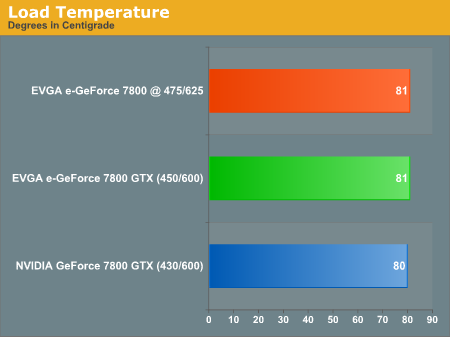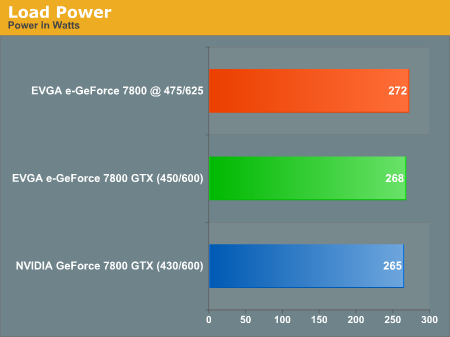Vendor Cards: EVGA e-GeForce 7800 GTX
by Derek Wilson & Josh Venning on July 16, 2005 12:05 AM EST- Posted in
- GPUs
Heat, Power and Noise
Heat

Power
To test the power usage of the card, we measured the total watt usage of the computer at the wall outlet. We documented the power usage of our CPU in 4 different states. The first state was when the computer was idle, and with only Windows running (i.e. no other programs running). Then we plugged in our reference card and ran a performance test for the second. The two last states included the EVGA e-GeForce 7800 GTX and running the test in both normal and overclocked modes, consecutively. This way, we were able to get a general idea of how the power usage varies with the cards, and how significant an impact that it might have.

Noise
We didn't notice any issues with the sound level of the card. It wasn't quiet, but it wasn't as loud as some of the dust-buster solutions that we've seen in the past. The CPU fan was the dominant noise in the room, so we calculated the noise level of the card using a formula that we've employed in the past along with measurements of ambient SPL (everything off), ambient+CPU (computer on with no video) SPL, and total system SPL (everything on). We had to do this because we were unable to turn on the graphics card's fan without turning on the system.The end result gave us an SPL of 38.4 dB, which we will compare to other cards in future articles. This number will be on par with other 7800 cards that have reference-style heat sinks; but if nothing else, we will be able to get an idea of how much noise varies for this type of heat sink.
Those fairly conscious of their computer's power usage may be reluctant to overclock the card because of the jump in power load. And if your computer case has a circulation problem or you live somewhere really hot, it may not be advisable to overclock it. But for most people, the extra heat and wattage shouldn't have that great of an impact given the performance boost.










26 Comments
View All Comments
masteraleph - Sunday, July 17, 2005 - link
Where's the comment about Dual-Link DVI on one of the outputs? Shouldn't the fact that this card can run the Apple 30" display be noted somewhere in the review?semo - Saturday, July 16, 2005 - link
the upcoming 7800 from evga will have (with the green cooler) asymmetric cooling system (acs). xbitlabs has reported on it yesterday i thinktommyw - Saturday, July 16, 2005 - link
I was reading this article http://www.digit-life.com/news.html?119317and would be interested to know if Anandtech has any comments on it. According to that, if I understood properly, it is not possible to change the clocks by 1MHz steps, but by 27MHz steps. And that different parts of the core work on different frequencies.
Interesting how will this change OCing? New challenges, yes :-) !!
L3p3rM355i4h - Saturday, July 16, 2005 - link
Last page type "pricy"Son of a N00b - Saturday, July 16, 2005 - link
yeah OC'ing is an addiction...I still OC my 6800's a bit to play CSS even though I do not have to everytime I play (i never leave it set to startup for stability issues)....but I cannot play if my cards are not OC'edanyways AWESOME article and idea for it guys! cant wait to see BFG's
JustAnAverageGuy - Saturday, July 16, 2005 - link
Typo, page 37800 GXT
Typo, page 4
"PowerStreams"
PrinceGaz - Saturday, July 16, 2005 - link
If I was going to spend about $600 on a gfx card, I think I would enable at least 4x AA in games that work correctly with it. If ncessary drop down to 1600x1200 from the tested 1920x1440 or 2048x1536; my monitor does support 2048x1536 and at a good refresh rate (85hz), but the jaggies are far more noticeable at 2048x1536 without AA, than they are at 1600x1200 with 4x AA.Samus - Saturday, July 16, 2005 - link
I can't believe they put up all those charts and failed to compare it to ANYTHING other than a 7000 series card. As #2 stated, exactly how many people are going to overclock this card? How many people care?I can tell you a lot of people care to know how well it fares against a 6800.
Zebo - Saturday, July 16, 2005 - link
XFX 7800GTX is much better470/1250 default OC and a pretty decent game controller included. Some dudes are hitting 490/1300 pretty easy with mild OCing.
#2 -- I agree for most part.. It's different taking a 1.8 A64 to 2.8, scores will massivly improve..but some of us like to OC everything no matter what..it's an addiction trust me.:P
drifter106 - Saturday, July 16, 2005 - link
#5 thanks for the comment on your card and its overclocking ability...some people just don't know how to comprehend the written word...maybe they need to get their shit together before they make themselves look silly